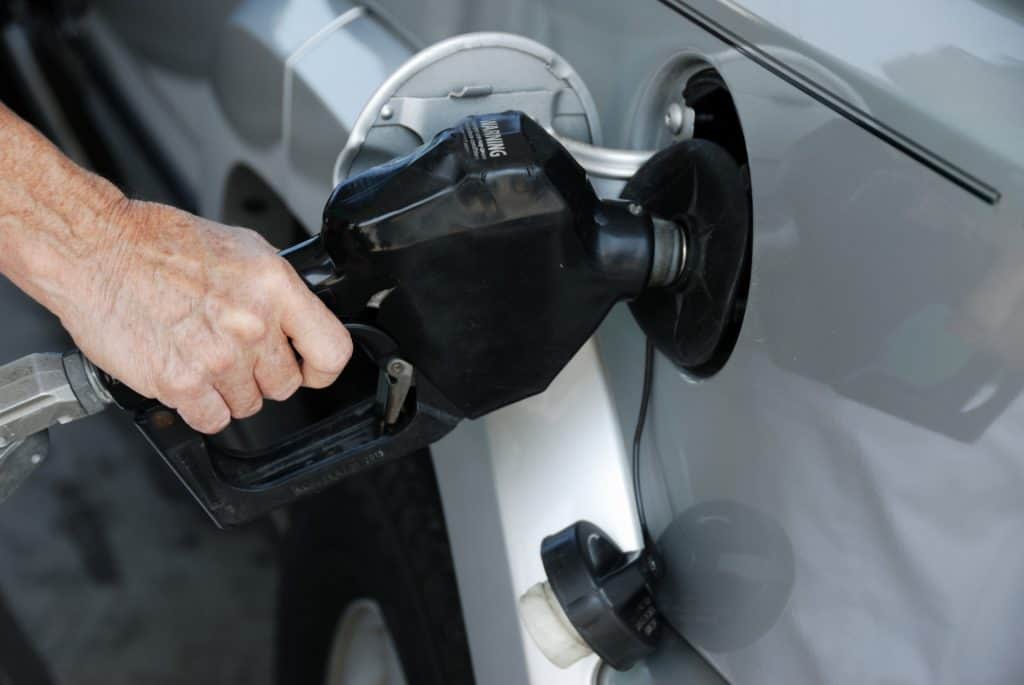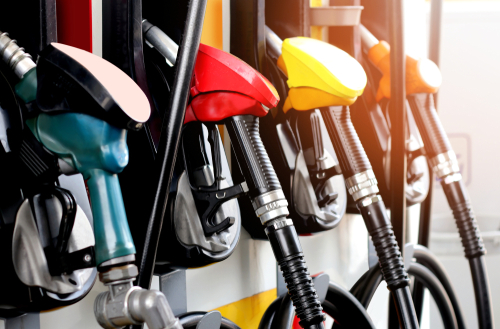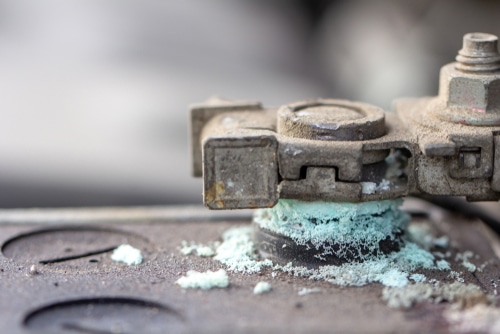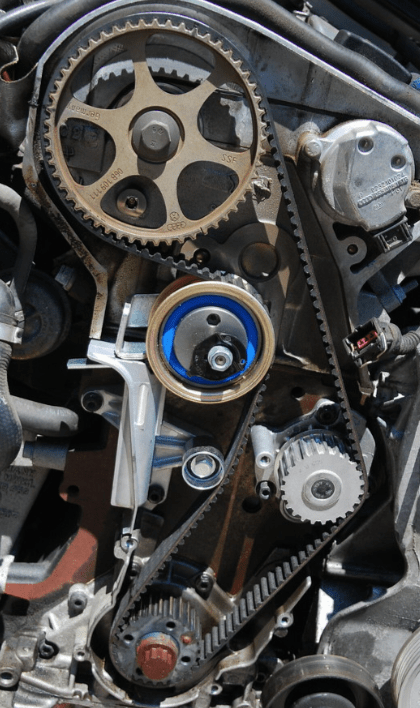
If your Toyota Aygo is shutting down while driving, it’s a real safety hazard. Vehicles are a lot harder to control without power brakes or steering.
Below is a list of the most common reasons your Aygo would randomly die while driving. Before looking at anything, is the check engine light on?
If it is, you’ll want to start with whatever trouble code you get from an OBD2 scanner. It can save you a lot of time.
Shuts Down While Driving Quick Help Table

Use this table to help you quickly determine why your Toyota Aygo shut down while driving. Click the links in the “Cause” column to get to the relevant section of the article for your car.
| Cause | Shuts Down When | Notes |
|---|---|---|
| Auto start/stop | Completely stopped | There should be a button to deactivate this feature (check the owner’s manual) |
| Out of gas | It randomly dies and won’t restart | You should hear the fuel pump priming, the gas tank should sound hollow |
| Faulty fuel pump | At any time, may restart | You won’t hear the fuel pump priming (check below for the sound) |
| Clogged fuel filter | When pressing the gas | It may have stalled at upper RPM |
| Bad gas | Right after filling up | Usually happens right after filling up |
| Chassis ground | Anytime, particularly after a big bump or hard cornering | Not very common, but easy to check |
| Battery Connection | After hitting a big bump | Not very common, but easy to check |
| Bad Alternator | After the battery light has been on for a while | Usually, the battery light will be on before the engine dies |
| Sensor Issues | At any time | It may be intermittent, there should be trouble codes |
| Timing | At any time | It sounds awful as the timing belt or chain slaps the timing cover |
| Seized engine | Over-revved or out of oil | Check the oil level |
Toyota Aygo Shuts Down When Driving: Top Causes

Always start your Toyota Aygo shuts down while driving diagnosis by looking to see if there are any stored trouble codes. They can provide valuable insight as to what system is causing your car to die.
Parts stores can scan it for you if you don’t have access to a scanner. But we don’t recommend driving anywhere until your Aygo is fixed since dying at the wrong time can cause a collision.
1. Auto Start-Stop
More and more cars and trucks are coming with a feature that kills the engine at a stop light. If your engine shuts down until you let off the brakes or move the steering wheel, it’s normal. There’s usually a button that deactivates this feature, but you’ll have to push it every time you start your Aygo.
2. Out of Fuel

Your Aygo’s engine needs three things to run properly; air, fuel, and spark. If your motor runs fine and suddenly dies, one of these three things is abruptly taken away. In this case, it’s usually fuel.
The most common reason your car shuts off when driving is a lack of fuel. The most likely cause is an empty fuel tank aided by a fuel gauge that’s not as accurate as it looks. Even if it indicates there is fuel in there, bang on the tank. If it makes a hollow sound, it’s probably empty.
Turn the key from off to on. You should hear the fuel pump trying to prime your Aygo’s engine. If you don’t hear any noise, that indicates a faulty fuel pump, which is covered in the next section.
3. Bad Fuel Pump
Another common reason that your Aygo may be starving for fuel is a bad fuel pump. The fuel pump sends highly pressurized fuel to the fuel rails. The engine can die if the fuel pressure is not high enough to atomize the gasoline properly.
The fuel pump is often not monitored by the engine’s computer, which means it doesn’t activate the check engine light when trying to figure out why your car is randomly dying.

If the engine isn’t starting, turn the key to the on position and listen carefully. You should hear a whining noise. That’s the fuel pump priming the fuel system. If you hear nothing, that strongly indicates that the fuel pump is bad.
Since the fuel pump is in your Aygo’s gas tank, you may want to get a second set of ears so you can be absolutely sure you don’t hear it. If you don’t hear it, you should manually check the fuel pressure at the fuel rails. If it is not as high as it should be, you either have a bad fuel pump, or the filter could be clogged.
The fuel pump may be going out sporadically. This would mean it’ll die on the road and fire back up even a few seconds later.
4. Bad Gas

If your car has been running rough recently and randomly shuts off while driving, this might be a sign that you need to drain your fuel tank and get fresh gas. The gas in the fuel rail will need to be emptied as well.
Contaminated
Sour gas is one of the most common causes of a vehicle shutting off when driving. This is because gasoline can become contaminated with dirt, water, or other substances, which can cause your engine to shut off while driving.
Bad gas could be the issue if your Aygo shuts off a few minutes after you last filled it up.
Old Gas
Gas can also go bad with age. Gas shouldn’t be allowed to sit for more than a few months without being used, and if it has been sitting for an extended period, it loses its combustibility.
Old gas can also contain deposits that cause your engine to shut off. If you are experiencing this issue with a Toyota Aygo that has not been driven in a while, draining the fuel tank and replacing the gas is likely to help.
5. Fuel Filter
A clogged fuel filter will usually start by reducing fuel pressure. So, if your Aygo ran fine at low RPM, but stumbled when pressing the gas, a clogged fuel filter could be a possibility.
6. Battery Cables

Check the battery cables to ensure they are debris-free and are correctly bolted to the battery posts. Follow the black ground cable to whatever it is connected to. Ensure it is secure, and no corrosion or rust could keep it from making a solid ground connection.
7. Engine to Chassis Ground
The engine needs a solid ground to the chassis for your Aygo’s various electrical systems to work. If that cable is corroded, there could be problems such as misfiring, slow/no starts, or even the engine dying while driving. This is a common cause of many “gremlins.”
8. Bad Alternator

If the battery light was on before your Aygo’s engine died, suspect the alternator.
The alternator is responsible for charging the battery and keeping your Aygo running. If the alternator goes bad, the vehicle will run off the battery’s power supply (which is there mostly for starting your car and as a backup reserve).
Once the battery has been depleted, the ignition system will no longer be able to fire properly. You should see a battery or alternator light long before the engine dies. If you didn’t see it, it’s doubtful that the alternator or battery is at fault. If you did see the warning light, have the alternator and battery tested at the parts store. Replace them as needed.
9. Issue With Sensors
There should be stored trouble codes if this is the problem.
The crankshaft and camshaft sensors tell the engine where your Aygo’s crank and cam are located in their 360° revolutions. If they stop reporting this data, even momentarily, your car will not know when to fire the spark plugs, and it’ll stop running.
The mass air flow sensor can also go bad. These sensors should trigger a trouble code if they have a problem through.
10. Timing Issue

If the timing chain/belt jumped or broke. It can cause your Aygo to stop running on the spot. You may have heard it slapping around as the engine died. Your car’s engine may or may not turn over after this happens. It won’t start.
Seized Engine
If your Aygo’s engine is locked up, it’ll probably make a clunking sound but won’t start. The most common reason for this to happen is a lack of oil.
Conclusion: Toyota Aygo Dying While Driving
Usually, there will be trouble codes stored that should provide clues as to what’s happening. You should start your diagnosis with them.
In the absence of a check engine light, take a good hard look at the fuel pump. If that’s not the issue, we recommend having an experienced mechanic look at the problem. They’ll need to record the telemetry from the OBD2 system when the car does it again. Then, they’ll be able to determine which part of the vehicle has the problem. This is a DIY site; we hardly ever throw out the mechanic recommendation.
